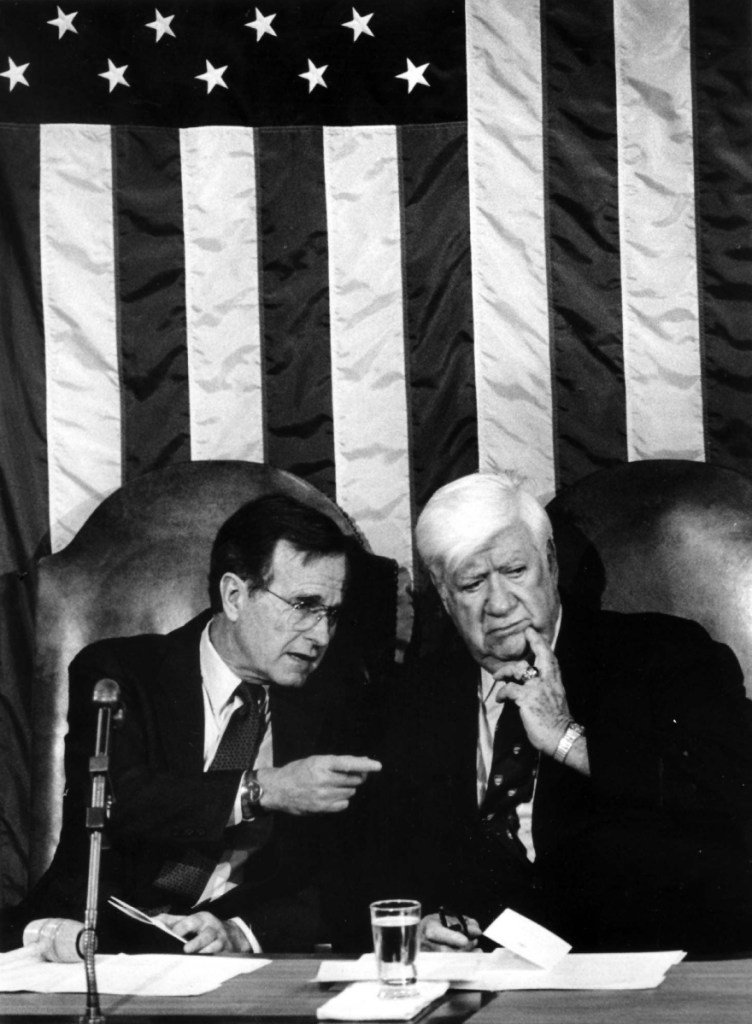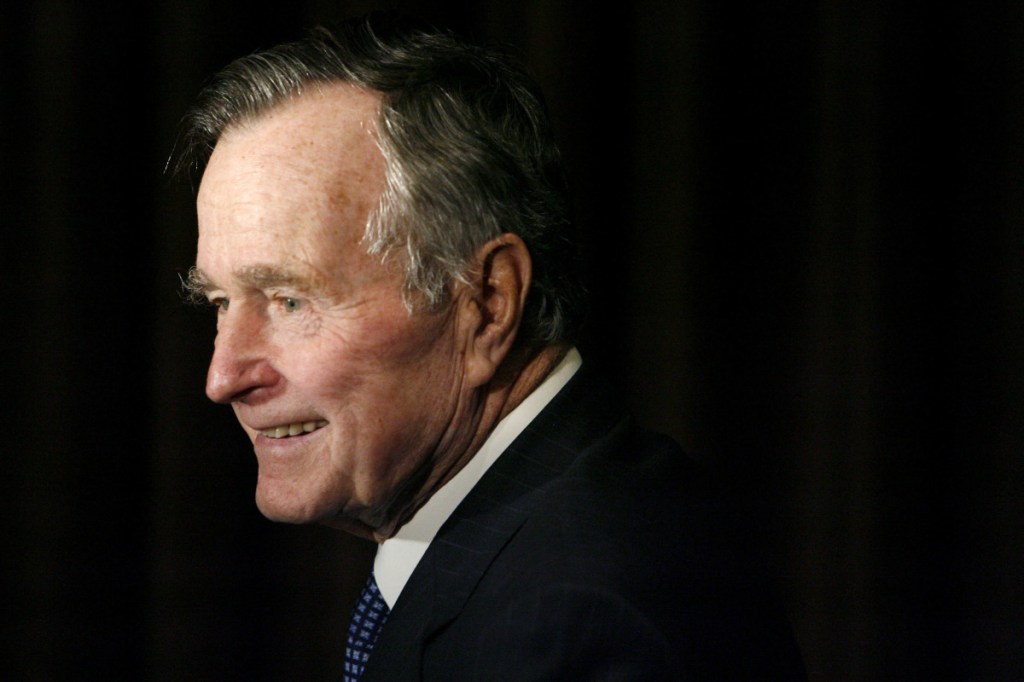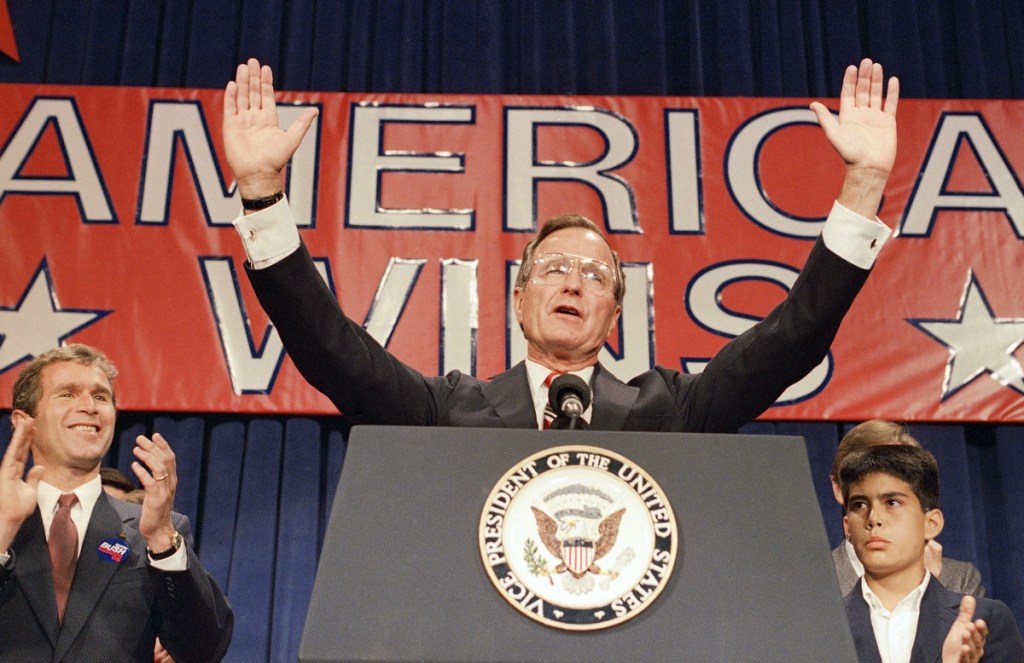The statement in the name of then-President George H.W. Bush was posted quietly in the White House press room on the morning of June 26, 1990, but there was nothing innocuous about its contents. It was a political thunderclap, the beginning of the remaking of the Republican Party and part of the unintended legacy of Bush’s presidency.
It was a statement designed to jump-start stalled budget talks. It did that and more, providing the catalyst that changed the Republican Party into an aggressive and hard-edge brand of conservatism that would hold sway for two decades.
The statement was a renunciation of one of the most famous campaign promises: Bush’s declaration of “no new taxes,” which he made as he accepted the Republican nomination in 1988. The pledge was a bow to conservatives, who always regarded him with suspicion, if not outright hostility. When he reneged on the promise, they exacted revenge.
Bush will be remembered for many things. His long and exemplary service to country, the steadiness that marked his governance, and the humility and decency he brought to his political relationships are central elements of his legacy.
ROUGH AND READY, IF NEED BE
He was not above rough politics. His 1988 campaign will be remembered as one in which he pushed the envelope with tactics and issues – the Pledge of Allegiance and prison furloughs – that put his opponent, Michael Dukakis, on the defensive and left Democrats crying foul. In office, he was still in the shadow of Ronald Reagan, who in 1980 had selected him as vice president. Rhetorically, he was no Gipper.
As president, Bush proved that careful and methodical can be more effective than big and bold, that responsibility to country takes precedence over loyalty to party, even if it comes at great cost, that compromise is not a dirty word.
His presidency came during a time of upheaval in the world. If Reagan’s presidency hastened the end of the Cold War, it was left to Bush to manage the fall of the Soviet empire and to do so without bloodshed. He accomplished that with skill and strategy, aided by Secretary of State James Baker III and national security adviser Brent Scowcroft.
When Saddam Hussein invaded Kuwait in 1990, Bush famously declared, “This will not stand, this aggression against Kuwait.”
Again, with Baker and Scowcroft at his side, he quickly began to deploy a U.S. force in the Persian Gulf while assembling an international coalition to build support at the United Nations for ejecting the Iraqi forces from Kuwait and to help underwrite the cost of the upcoming conflict.
After the war ended, with U.S. forces ordered to stop short of Baghdad, Bush’s approval rating soared close to 90 percent. Twenty-one months later, he was driven from office. A transition inside the Republican Party that was already underway accelerated.
Two years after that, the House was in Republican hands for the first time in 40 years, and the dominant figure in the party was Speaker Newt Gingrich, who was the antithesis of the defeated president in so many ways. The party began to shift from a philosophy of smaller government to one of anti-government, particularly anti-Washington.
The statement that appeared in the White House pressroom on that morning in June 1990 showed Bush to be a president who was prepared both to compromise with the Democrats, even if it meant breaking a campaign promise, for what he believed were the best interests of the country and to take personal responsibility for his actions.
A BAD DEAL FOR HIM
In the statement, Bush said, “It is clear to me” that a series of elements had to be included in any budget agreement, among them “tax revenue increases.” The words “to me” were added to the draft at the insistence of Democrats, who did not want Bush to be able to slide away from the compromise. That he agreed was evidence of his belief that this was the only route to a deal, which proved to be the case.
But the agreement also empowered Gingrich, a onetime backbencher, in his quest to remake the party. On the day that Bush and the other leaders assembled at the White House to announce that they had an agreement, Gingrich returned to the Capitol to begin mustering the forces of opposition. It was the beginning of a new Republican Party.
Gingrich’s wing saw conflict with the Democrats as essential to creating sharp differences between the parties; Bush saw cooperation with Democrats as essential for the country and, he hoped, for winning re-election. On that, he proved mistaken.
A recession that he seemed unable to manage, a skilled opponent in Bill Clinton and the entry of independent candidate Ross Perot combined to end the Bush presidency after one term. Those in the forefront of creating the new Republican Party were relieved that Bush had been ousted.
George W. Bush sought to restore some of his father’s sensibility to the party when he won the White House as a “compassionate conservative.” But he nonetheless drew the ire of the right on immigration and spending.
Today President Trump is redefining the party in his own image, moving it ever further from the Republican Party over which George H.W. Bush presided. Bush’s role as an instrument in these changes will be remembered as a central part of the fallout from his presidency.
Send questions/comments to the editors.





Success. Please wait for the page to reload. If the page does not reload within 5 seconds, please refresh the page.
Enter your email and password to access comments.
Hi, to comment on stories you must . This profile is in addition to your subscription and website login.
Already have a commenting profile? .
Invalid username/password.
Please check your email to confirm and complete your registration.
Only subscribers are eligible to post comments. Please subscribe or login first for digital access. Here’s why.
Use the form below to reset your password. When you've submitted your account email, we will send an email with a reset code.